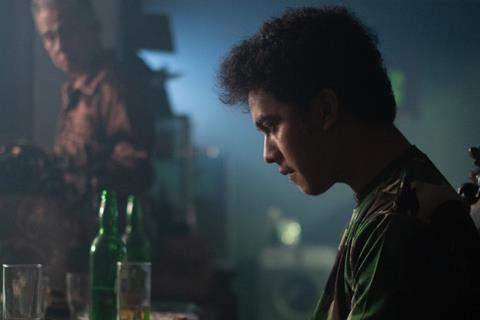Southeast Asian films are gaining profile on the international stage.

A new wave of Southeast Asian films is making a splash at top international festivals, as a growing number of award-winning features emerge from the region.
Indonesian director Edwin’s Vengeance Is Mine, All Others Pay Cash won Locarno’s Golden Leopard in 2021; Thai director Jakrawal Nilthamrong’s Anatomy Of Time premiered in Venice’s Horizons section last year before claiming the grand prize at Tokyo Filmex; and Indonesian director Kamila Andini’s Yuni won the top Platform prize at Toronto 2021.
They marked an auspicious start for the Southeast Asia co-production grant (SCPG), a first-of-its-kind initiative launched by Singapore Film Commission (SFC) in 2019 to support regional collaborations. The trio of films were among the eight recipients of the inaugural edition.
Following its 20th anniversary in 2018, SFC director Joachim Ng explains that the organisation expanded to support Southeast Asian co-production projects in a bid to “encourage Singapore’s talent to collaborate creatively with their counterparts in the region”.
“We can help Southeast Asian filmmakers get discovered and showcase Southeast Asian stories to the world, like how the Europeans support their filmmakers collectively,” he says.
The grant is open to projects directed by non-Singaporean, Southeast Asian directors with at least one Singaporean and one Southeast Asian producer on board. The amount of funding offered has been raised up to $216,000 (s$300,000) per project.
“Funding is always hard to come by and incentives will smooth the process,” says Lai Weijie, the Singapore-based co producer of Vengeance Is Mine, All Others Pay Cash, which was set up as an Indonesia-Singapore-Germany co-production. The 1980s-set action drama was in development for several years, winning prizes at Busan’s Asian Project Market in 2016 and the Hong Kong-Asia Film Financing Forum in 2018.
“Private investors always want to wait until the financing is in and see what the terms are,” adds Lai. “When we got the Singapore grant, it helped to make it real, giving private investors strong motivation to sign up.”
Latest projects

A total of 20 Southeast Asian productions — from Indonesia, Malaysia, Myanmar, the Philippines, Thailand and Vietnam — have been awarded an SCPG since 2019.
The latest completed projects include Thai director Sorayos Prapapan’s Arnold Is A Model Student, which played Locarno, and Indonesian director Makbul Mubarak’s Autobiography, which premieres in Venice’s Horizons before heading to Toronto. Both debut features have also received support from the Asean Co-production Fund (ACOF), which was launched by the Film Development Council of the Philippines (FDCP) in 2020 to support Southeast Asian cinema in similar ways to the SCPG.
FDCP also runs an international co-production fund for international projects directed by Filipino filmmakers, recipients of which include Carlo Francisco Manatad’s Whether The Weather Is Fine, selected for Locarno last year, and Lav Diaz’s When The Waves Are Gone, which premieres out of competition at Venice this year.
“National and regional funds are new to Southeast Asian filmmaking,” says Yulia Evina Bhara, the delegate Indonesian producer of Autobiography. “They help to strengthen projects not only in the financing aspect but also in the creative aspect, as these initiatives encourage filmmakers to collaborate — which make financing and collaboration easier and much more fun.”
As a result of the various grants, Bhara and first-time feature director Mubarak get to work with co-producer Jeremy Chua and composer Bani Haykal from Singapore, Filipino co-producer Armi Rae Cacanindin and editor Carlo Francisco Manatad, and Polish cinematographer Wojciech Staron.
SFC director Ng is pleased that a growing number of Southeast Asian projects can secure funding outside the region. “SCPG was meant to be a boost and a catalyst,” he says. “Great film projects will attract interest and investment from other parts of the world like Europe and Taiwan.”
Ng is stepping down from the SFC in early September after leading the team for the past 11 years, while Liza Dino stepped down as chairperson and CEO of FDCP in July, a role she had held since 2016.
Fresh talent
After Yeo Siew Hua’s A Land Imagined became the first film from Singapore to win Locarno’s Golden Leopard in 2018, the festival created a special platform through the Open Doors industry programme for Southeast Asian cinema. From 2019 to 2021, a fresh crop of emerging Southeast Asian filmmakers took the spotlight each year, significantly raising their profiles in Europe. Some 27 producers were selected including Ifa Isfansyah who produced Yuni and Kamila’s Berlinale 2022 Competition debut Before, Now And Then, which went on to win Indonesian actress Laura Basuki the Silver Bear for best supporting performance.

Locarno Open Doors Hub, the international co-production platform, has showcased 24 Southeast Asian projects over the 2019-21 cycle devoted to the region, including recipients of SCPG and ACOF including Bui Thac Chuyen’s Glorious Ashes and Amanda Nell Eu’s Tiger Stripes, both in post-production, and Petersen Vargas’s Some Nights I Feel Like Walking and Pham Ngoc Lan’s Cu Li Never Cries, both set to shoot by early 2023.
Many Southeast Asian filmmakers have been invited to other European development labs and project markets such as TorinoFilmLab, EAVE Ties That Bind and the Berlinale Co-production Market where they get to meet European producers and sales agents. Many of them end up working together, tapping into European funding such as France’s Aide aux Cinémas du Monde, the Berlinale’s World Cinema Fund and the Polish Film Institute Fund.
In Asia, Singapore International Film Festival has played a crucial role in reshaping Southeast Asian cinema. After its relaunch in 2014, the festival added the Southeast Asian Film Lab and Southeast Asian short film competition, providing an annual platform for young filmmakers to meet and collaborate. There was also the now-defunct Southeast Asia Fiction Film Lab, co-founded by Raymond Phathanavirangoon in 2016, and Bangkok-based Purin Pictures, which has provided funding for Southeast Asian films since 2017.
While multiple-country co-production projects are the way forward, they can be complicated. “Before then, we can still change our mind,” says Singapore producer Lai, who produced Singapore director Kristen Tan’s Pop Eye, which was set in Thailand featuring Thai cast and crew but was not an official co-production. “With official co-productions, things need to be set in stone. The timeline has become more rigid with less room for improvisation. It’s a good and a bad thing.”
Autobiography comprises seven co-production countries: Indonesia, France, Germany, Poland, Singapore, the Philippines and Qatar. “The key is to communicate and make the job division as clear as possible,” says Bhara. “For example, our French partners are responsible for post-production and our Polish partners are responsible for the cinematography department, so every collaborator does not intervene in each other’s responsibility.”
However, the real challenge lies in “maximising the funds to the maximum benefit of the creative aspect of the film”, she adds. “As almost all funds come with a spending obligation, it is up to me as a producer to juggle the funds and lay the ground for director Makbul’s vision to flourish. It’s like a puzzle.”
Southeast Asian projects have also piqued the interest of Taiwan’s funding bodies. Jow Zhi Wei’s Tomorrow Is A Long Time and Nelicia Low’s Pierce — both supported by SFC’s new talent feature grant — were filmed in Taiwan as they received various public funding including from Taiwan’s International Co-funding Programme, a new incentive from Taiwan Creative Content Agency, while Malaysian director Chong Keat Aun’s Snow In Midsummer, supported by the SCPG and Taipei Film Commission, will conduct part of its post-production in Taiwan.






![The Brightest SunScreen[Courtesy HKIFF]](https://d1nslcd7m2225b.cloudfront.net/Pictures/274x183/3/5/0/1448350_thebrightestsunscreencourtesyhkiff_312678.jpg)


















No comments yet